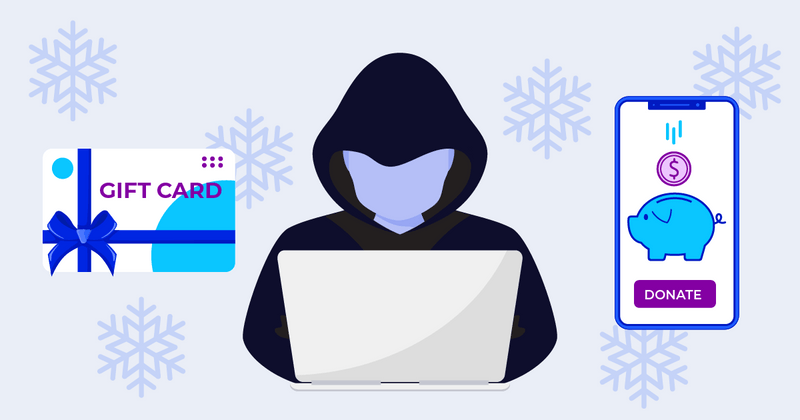
The FBI recently provided some helpful guidance for holiday shopping safety, and with the holidays just around the corner, it’s the perfect time to review how to stay secure.
The holiday season is a good time to remind your customers to follow security recommendations and protect themselves from threats like phishing, scams, and identity theft.
Table of Contents
The most pervasive holiday scams that affect your company
Identity theft
Identity theft is a highly prevalent issue around the holiday season because fraudsters use stolen personal information and credit cards to make purchases from online retail sites. Once completed, the order is fulfilled and the product or service is delivered to a newly-changed location.
Phishing
The holidays are, unfortunately, perfect times for phishing attempts, as the fraudsters notice the uptick in digital shopping and try to take advantage. Fraudsters use messaging around seasonal items to entice a holiday shopper to click a link in an email or SMS.
Though phishing can be targeted towards consumers, many businesses are bombarded with phishing emails and SMS under the guise of a manager or boss.
Fraud trends showing up on the radar this year
Before going over the best practices to avoid holiday swindles, here are some trends popping up as we near the holiday season.
- Non-Delivery Fraud. A non-delivery scam is when a buyer purchases an item but the item is (intentionally) never shipped to them.
- Non-Payment Fraud. A non-payment scam is when a seller sells an item or service, delivers it, but is not actually paid in return.
- Auction Fraud. Auction fraud occurs when a seller purposely misrepresents a product or service.
- Gift Card Fraud. There are many kinds of gift card fraud, many involve scamming unsuspecting victims by having them pay using a gift card.
- Fake Charity Fraud. Fake charity fraud shoots up during the holidays, as people are often more willing to give and share. In these cases, fraudsters create fake websites or phony charities to elicit funds from victims.
- Ratings Fraud. Ratings fraud distorts a company’s consumer feedback, typically by stealing valid account names to make phony purchases and claims.
During the holidays, people tend to buy digital goods and items more often. The most common scams that ruin this experience are non-delivery and non-payment scams.
These scams are costly, too, as a recent report found that non-payment and non-delivery scams cost victims over $337 million dollars in 2021 alone.
Best practices to avoid holiday scams according to the FBI
Scammers change their manner of attack to align with the holiday season, so be sure to adapt by using the following best practices, provided by the FBI.
Stay alert when using digital devices
It’s easy to go on autopilot when browsing the web, checking email, and logging in to different accounts. The key to staying safe, especially during the holidays, is to pay attention to what you’re doing. For example:
- Double-check sources. If you’re interested in a link or attachment you find in an email or on a social media page, check to see if it’s from a trusted source. Steer clear from clicking on links that seem suspicious. Furthermore, ensure the link is from the company it claims to be by checking the actual sender address.
- Stop and evaluate your actions. If you have been instructed to login to a specific portal or asked to update your username, password, or profile, make sure you’re dealing with the actual company and not a fake. Find their phone number and call them to see if they’re who you’re dealing with.
Be extra careful when making purchases or sales online
With the holidays in full swing, people are buying and selling more items online. To avoid the hassle and stress of getting swindled, here are some ways to make sure your transactions are safe:
- Learn to notice red flags from sellers. Scammers play all kinds of tricks, but there’s usually a pattern you can pick up on. For example, they may claim to be a factory rep for a popular item. Or maybe they give their location but then create excuses as to why they can’t ship from that location. Whatever the case, view these as red flags and proceed with caution.
- Ensure website authenticity. There are a lot of clone websites that look legitimate but are aiming to do you harm. To avoid this, check the website URL before entering important information such as credit card number onto the site.
- Refer to ratings when possible. In many cases, a company or seller has feedback or ratings that are easy to find and can guide you in a purchase decision.
Keep your guard up when making payments
- When possible, ask for tracking information. A tracking number allows you to ensure your purchases have been shipped correctly, to the right location, and on time.
- Credit cards give you extra safety when shopping online. Check your statement often and dispute fraudulent charges. Furthermore, if you’re selling online, use caution shipping items to addresses that differ from the buyer’s address, which is given with the credit card details.
- Look out for payment scams. If the seller of an item wants you to wire them money or pay with an item using a pre-paid gift card, the deal is suspect. Choose to do business with sellers who offer safer forms of payment.
How Telesign can protect your company and customers from holiday fraud
Telesign equips your company with the tools needed to keep your customers safe from fraud during the holidays. Here are some key ways Telesign protects you:
- Intelligence and PhoneID help defend against account takeover (ATO) attempts.
- Phone ID helps verify identity signals. For example, an online lending company, upon verifying identity signals, can confirm that a customer applying for credit is a real person and will pay their loan back.
- Intelligence and Phone ID can be used in onboarding flows to limit promo abuse.
‘Wrapping’ everything up!
The holidays are a blast, and the best way to keep them fun is to protect yourself and your customers from all types of fraud. If you’re interested in learning more about shutting down holiday fraud issues, talk with us today. Happy holidays!


